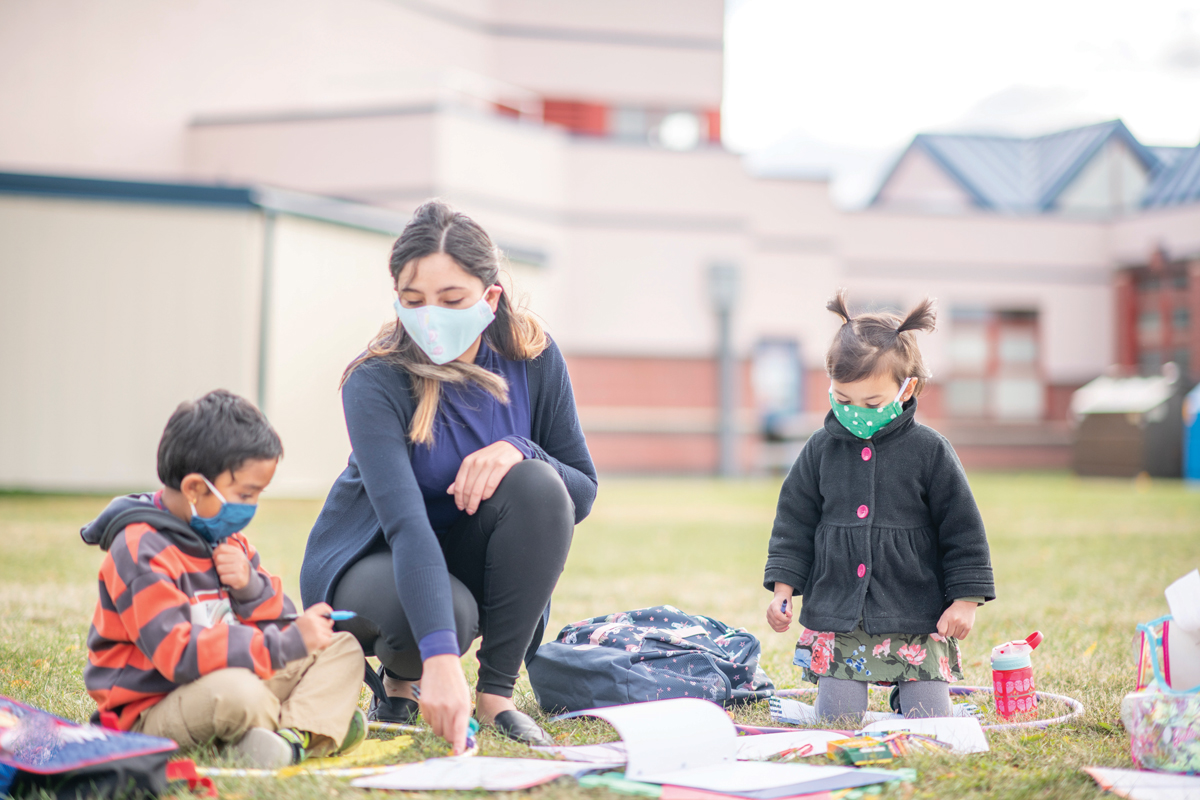
After a year of remote learning, returning to school is sure to be an anxiety-riddled event. The pandemic upended business as usual across the country, including for students of all ages. But children are resilient. And while the transition to in-person learning may begin with a few hiccups, here are five childhood educators — whose expertise ranges from toddlers to college-aged — offering reassurance to parents that with their guidance, the kids will be alright.
The Littlest Ones Need Hand-Holding
“Regardless of when young children are going back, they haven’t been with other groups of children in a while. Depending on the new COVID-19 rules, the return to school will feel different, and parents should see the transition as if kids are starting to separate all over again. Students are very excited to be with others, and they bounce back, but this is new, and they don’t have practice. Parents should help them to separate and acclimate by introducing them to the teacher, whether over Zoom or by email. If they know another child in the class, try to make contact somewhere outside, such as at the park. Expect a period where the child may be excited and then apprehensive.
“If it’s a new school that they’re going to, parents could walk or drive by and let the child know this is where they’ll be going. Show them a playground; tell them a teacher will be there to help and that their parents will see them at pickup or at dinner. The idea is that mommies and daddies will be back — ‘I drop you off, I leave, I come back.’ This is true for preschoolers as well as for first graders. Also, expect an increase in conflict initially, which is not a bad thing. The children will settle in.” —Tovah Klein, Adjunct Associate Professor, Psychology; Director, Barnard College Center for Toddler Development
Adolescents and High Schoolers Still Need Reassurance
“For high schoolers preparing to reenter the school ecosystem, the challenge can be summed up by paraphrasing political consultant James Carville: It’s the social-emotional, stupid. Adolescents and young adults are very intellectually resilient and adaptable — they will catch up with the work and gain the skills without much difficulty. They will adjust to waking up early and to the new bathroom pass protocol. Different this time is the level of anxiety I anticipate. Teenagers are mostly id: Everyone is looking at me, OMG this outfit. To emerge from isolation back into the social petri dish is daunting for most kids, and this is where parents should focus their attention.
“They should engage their teens and acknowledge their stressors. Reassure them that what they are feeling is normal and experienced by almost every student returning to school. Particular attention should be given to those who are starting at a new school, as freshmen or transfers. Assure them that they are not alone.
“Additionally, parents can advocate for their children by requesting the school create small social groups for checking in, for example. If students can connect with peers before class, this can help to ease a lot of the feelings of being alone.” —Jessica Goring ’97, Principal, Bronx High School of Law and Finance
Pay Attention to Students With Special Needs
“After not having been in school for a year, going back may be especially challenging for a child with special needs. There are some things you can do to help ease the transition. Arrange for your child to visit their classroom and meet their teacher one to two days before school officially opens. If that’s not possible, ask the teacher to send pictures. The school setup is likely to be very different, and this will help your child know what to expect. Also, arrange a playdate with a classmate.
“Create a photographic social story that can serve as a visual plan for your child. The story can have pictures and text describing what your child’s day will look like when they return to school. Most importantly, have an open discussion with your child on their level, and reassure them that you will help make this transition as easy as possible for them.” —Hannah Hoch, Adjunct Assistant Professor of Psychology
College-Aged Kids Are Navigating Big Changes, Too
“Transitions are hard at any age. Some people handle them better than others, but many of us struggle. We have had lots of change in the past year. Whether students have been to college before or not, next year will likely be different. As we transition back to in-person learning, parents should provide space for autonomy. College-aged children are supposed to be leaving home and separating from their families. It is a time for them to establish independent identities. Being home for a year may have delayed this process, so supporting their independence is important.
“Understand that online and in-person learning can put different demands upon your child. They may find they need to take fewer courses or can handle more. Don’t pressure them to take the same credit load that they took online.
“Be there to listen, mostly, and when appropriate, advise without judgment. It’s possible that your child has suffered some distress that may not become apparent until they’re back at school. If your child needs emotional support while away, support them, direct them to the appropriate services available on campus, and inform the college if you have serious concerns. At the end of the day, this is your child, and what they want most is for you to love them.” —Lisa Edstrom, Senior Lecturer, Department of Education

